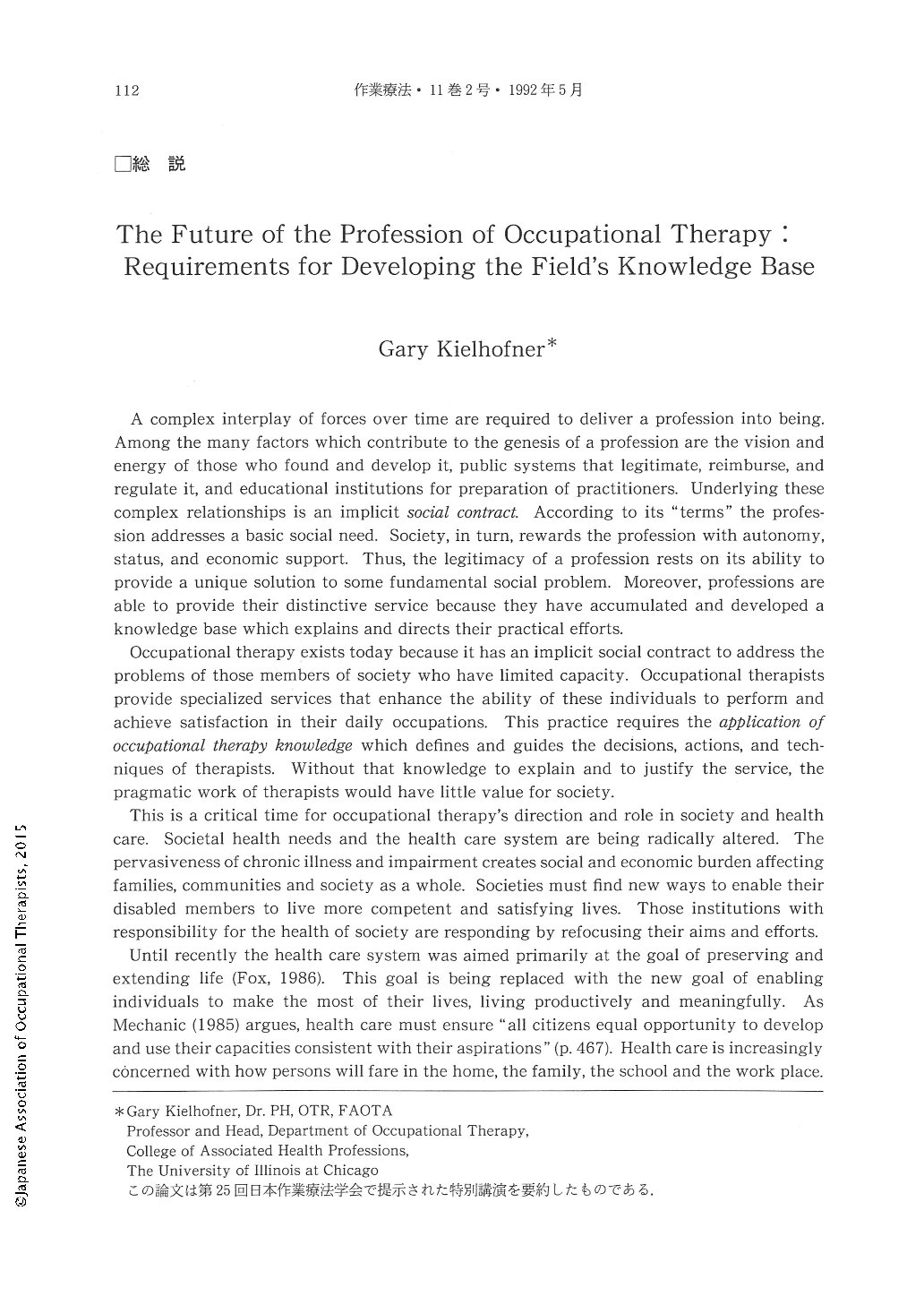Japanese
English
- 販売していません
- Abstract 文献概要
- 1ページ目 Look Inside
- 参考文献 Reference
A complex interplay of forces over time are required to deliver a profession into being. Among the many factors which contribute to the genesis of a profession are the vision and energy of those who found and develop it, public systems that legitimate, reimburse, and regulate it, and educational institutions for preparation of practitioners. Underlying these complex relationships is an implicit social contract. According to its "terms" the profession addresses a basic social need. Society, in turn, rewards the profession with autonomy, status, and economic support. Thus, the legitimacy of a profession rests on its ability to provide a unique solution to some fundamental social problem. Moreover, professions are able to provide their distinctive service because they have accumulated and developed a knowledge base which explains and directs their practical efforts.
Occupational therapy exists today because it has an implicit social contract to address the problems of those members of society who have limited capacity. Occupational therapists provide specialized services that enhance the ability of these individuals to perform and achieve satisfaction in their daily occupations. This practice requires the application of occupational therapy knowledge which defines and guides the decisions, actions, and techniques of therapists. Without that knowledge to explain and to justify the service, the pragmatic work of therapists would have little value for society.
This is a critical time for occupational therapy's direction and role in society and health care. Societal health needs and the health care system are being radically altered. The pervasiveness of chronic illness and impairment creates social and economic burden affecting families, communities and society as a whole. Societies must find new ways to enable their disabled members to live more competent and satisfying lives. Those institutions with responsibility for the health of society are responding by refocusing their aims and efforts.
Until recently the health care system was aimed primarily at the goal of preserving and extending life (Fox, 1986). This goal is being replaced with the new goal of enabling individuals to make the most of their lives, living productively and meaningfully. As Mechanic (1985) argues, health care must ensure "all citizens equal opportunity to develop and use their capacities consistent with their aspirations" (p.467). Health care is increasingly concerned with how persons will fare in the home, the family, the school and the work place.
A complex interplay of forces over time are required to deliver a profession into being. Among the many factors which contribute to the genesis of a profession are the vision and energy of those who found and develop it, public systems that legitimate, reimburse, and regulate it, and educational institutions for preparation of practitioners. Underlying these complex relationships is an implicit social contract. According to its "terms" the profession addresses a basic social need. Society, in turn, rewards the profession with autonomy, status, and economic support. Thus, the legitimacy of a profession rests on its ability to provide a unique solution to some fundamental social problem. Moreover, professions are able to provide their distinctive service because they have accumulated and developed a knowledge base which explains and directs their practical efforts.
Occupational therapy exists today because it has an implicit social contract to address the problems of those members of society who have limited capacity. Occupational therapists provide specialized services that enhance the ability of these individuals to perform and achieve satisfaction in their daily occupations. This practice requires the application of occupational therapy knowledge which defines and guides the decisions, actions, and techniques of therapists. Without that knowledge to explain and to justify the service, the pragmatic work of therapists would have little value for society.
This is a critical time for occupational therapy's direction and role in society and health care. Societal health needs and the health care system are being radically altered. The pervasiveness of chronic illness and impairment creates social and economic burden affecting families, communities and society as a whole. Societies must find new ways to enable their disabled members to live more competent and satisfying lives. Those institutions with responsibility for the health of society are responding by refocusing their aims and efforts.
Until recently the health care system was aimed primarily at the goal of preserving and extending life (Fox, 1986). This goal is being replaced with the new goal of enabling individuals to make the most of their lives, living productively and meaningfully. As Mechanic (1985) argues, health care must ensure "all citizens equal opportunity to develop and use their capacities consistent with their aspirations" (p.467). Health care is increasingly concerned with how persons will fare in the home, the family, the school and the work place.

Copyright © 1992, Japanese Association of Occupational Therapists. All rights reserved.


